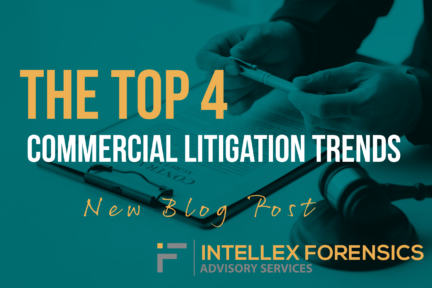The top 4 commercial litigation trends of 2023 have been swirling through the media, causing Americans to experience anything from panic, to elation. Below, Intellex Forensics will dive into these trends, and discuss not only what they are, but why they’ve bubbled to the surface this year.
Crypto
The first of the top 4 commercial litigation trends involves Cryptocurrency. Cryptocurrency took the world by storm in the late 2010s, and well into the COVID-19 pandemic, but crypto has been around for much longer. It first gained traction in 2009, with Bitcoin, the first cryptocurrency. Bitcoin is a bit like Kleenex is to tissues for crypto; everyone is familiar with the term. When it originally launched, it was priced at $0.09, and grew to a maximum price of $64,400 in November of 2021. Where the leader goes, others follow. Competitor cryptos, like Litecoin, Ethereum, and Bitcoin Cash grew by 1.3 – 3.8% during the pandemic.
As always, where there is a lot of money, there is also a greater chance for fraud. A story rolled through the news in 2022, about FTX. You can learn more about the specifics of this story on our blog here. To recap, FTX was a cryptocurrency hedge fund and exchange. It was founded in 2019, and reached it’s peak in 2021; it was the third larged crypto exchange, and counted over 1 million users. In November 2022, the company began filing for bankruptcy, and in December 2022, it’s co-founder and CEO, Sam Bankman-Fried, was arrested for multiple counts of fraud. This shot crypto into the limelight, and trust in the currency diminished.
Crypto, by it’s nature, is a promising but volatile market. There are plenty of opportunities for scams and fraudulent activity, and a lack of knowledge about the dangers of crypto is something would-be fraudsters often like to leverage. Check out our article to learn more about the top signs to watch for crypto-related fraud.
ESG (Environmental, Social, & Governance)
ESG (Environmental, Social, & Governance) has become a focal point of discussion in the finance world recently. In March of this year, in his first veto in office, President Biden vetoed legislation that would nullify the Department of Labor’s rule that allow fiduciaries to consider environmental, social, and governance factors when choosing retirement investments. Simply put, the standing rule, which Biden maintained through his veto, allows fiduciaries the option to consider climate change and other ESG factors when choosing what to invest their clientele’s money in.
ESG is a topic of hot debate through various groups in the United States. Some argue that it is necessary for future investment health, while others argue it pushes an agenda. Either way, the reason ESG has become a litigation trend in 2023 is because of ESG related disputes, which are directly related to the debate referenced above. Many people don’t know if ESG investments are the right investment, financially, for investors. In early 2023, the U.S. Securities and Exchange Commision (SEC), declared that ESG investing would be a top focus for the year, in three focus points:
- Whether ESG funds are operating how they are expected to, according to their disclosures
- Whether ESG funds are appropriately labeled
- Whether recommendations of ESG fund investments by money managers are made in the best interest of the investors
Class Actions
Class action lawsuit is a relatively familiar term for Americans. This is when a group of people, represented by a member or members of the group, are engaged in a lawsuit, typically with a company. In recent news, ‘greenwashing’ has become a common term. Greenwashing is when a company makes false claims or misleading promises about the eco-friendliness of their services or offerings. Similar to ESG, climate-related claims continue to be a hot-button topic in litigation. Delta Air Lines may face a class-action lawsuit concerning the company’s carbon-neutral claims. Similarly, Nike faces a class action lawsuit concerning how they have used deceptive marketing techniques to garner interest in a new line of apparel that claims to be eco-friendly.
However, while these climate-related claims have been heavily covered in the media and are of recent note, there still remains an undercurrent that stays close to the heart of most class-actions: deception, fraud, or both.
Cyber and Data Privacy
Among the aforementioned class action lawsuits, some are related to data security. As Americans start to work, shop, and play online through various avenues, apps, and methods, data privacy and cyber security have become a huge topic of discussion. While marketing teams are pushing for more personalized ads, your average American loses faith in the security of their device when an ad for an item they Google-search an hour ago pops up on their social media feed.
A hugely controversial news topic as of late is the social media app, TikTok. As tensions around the world continue, legislation has been proposed to more closely monitor foreign applications, and how they might access American data. Similarly, concerns have been raised over hotel rooms installing Amazon Alexa’s in their rooms, something that could be considered a listening device. Many Americans are concerned over their privacy, and who could be monitoring or stealing their private information.
As more of the world joins tech and automation, as jobs move data files to clouds, and as that metal and glass rectangle in your pocket becomes more and more important, cyber security and data privacy have never been more vital.
The top 4 commercial litigation trends of 2023 don’t seem to be slowing down, and we expect these trends to continue. If you are concerned about crypto fraud, ESG investment disputes, class action lawsuits, or cyber security and data privacy, please reach out to our team.
